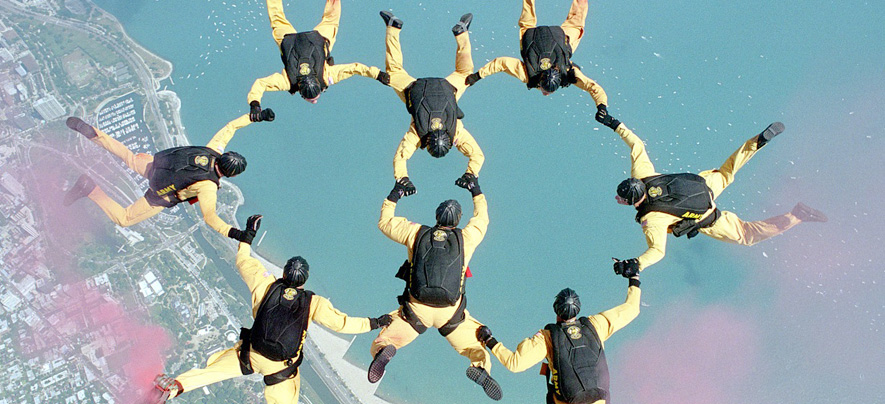Virtual Teams and the 5 Stages of Team Formation: Tips for the Team Leader

Leadership & Management
510 week ago — 6 min read
Organisations thrive on teamwork. If the team functions in sync, there is productivity. Poor team functioning does not just lead to poor productivity, but can actually be counter-productive. And as the team leader, you are responsible for how the team functions.
We operate in a non-linear environment today. Teams are widely dispersed. Project tenures, given the need for speed and quick go-to-market objectives, are often short. Teams are created and then dismantled. In this context, it makes eminent sense to understand the various stages of team formation and the implications.
Here’s a question – do you really think virtual teams are a recent phenomenon? If you nod yes, you’re wrong. The concept of virtual teams has been in existence for a long, long time. It just didn’t exist in a formal framework.
Think of a highly successful industry that’s been around since the early 1900s. It creates teams, dismantles them and creates other teams for other projects. Often, members of one team will meet and work together again on another project. The success of these virtual teams has been phenomenal. Running into billions of dollars.
Yes, I am referring to film industries the world over.
Everything in this team is for a defined duration. The project could be for a year, a few months or maybe a few years. The budgets are huge, productivity is high – and outcomes are usually successful. Everything in this industry is hired on a temporary basis. Sets. Clothes. Costumes. Actors. Directors. Lyricists. Technicians. Cameramen. Even the catering unit.
See how this process works, both for the film industry – and for your organisation.
There are 5 stages to team formation. These are:
- Forming
- Storming
- Norming
- Performing
- Adjourning
- Forming
This is a very important stage, where the leader - you - plays an important part. This is when the team has just been assembled for a project. The team could comprise colleagues that you already know and maybe some new people too. You, as the leader, have chosen these team members and asked them to assemble together for the first time. Some of the team members are meek and quiet. These are usually the people who are new to the team. Some are boisterous. These people are probably the old hands, and their familiarity could help or hinder the progress of the project. All of them are sizing each other up – they are going to be working closely together after all.
At this stage, there is a sense of excitement, depending on how the project has been announced. You introduce the team members to each other. You then take the team through the project. Your role here is to infuse a sense of enthusiasm. Bring in excitement. And energy. You outline the expectations of the team as a whole. The role that the project plays in your organisation’s overall objectives. And the fact that you are available at any time to help with issues and queries, etc.
You also announce the role that each person is going to perform, and how everyone fits in. - Storming
This immediately follows the forming stage. Team members go through a mix of emotions. Elation is accompanied by apprehension, excitement, nervousness, jealousy, anger, irritation and even deja vu. Some people might feel that they could perform a task given to another person, better. Some are nervous about how they will perform.
You observe this, knowing that the game of team members questioning the other members’ roles is temporary – and a very natural but important part of the team forming process.
At this stage, you do not play much of a role and do not intervene. Inter-personal and intra-personal forces must take care of themselves. You may be called to sessions where members will indulge in back-biting, openly questioning the role of other members. You may also receive secret requests for support. - Norming
After the storming stage, there is acceptance. People are now occupied with their own roles. They get to know each other better and appreciate why other members were assigned their particular tasks.
Anxiety gives way to anticipation again. Now you clarify individual doubts, and review progress.
There are occasional skirmishes, but these are usually task-related and not opinion-related.
Back you are in your role of cheerleader. You enthuse the team and motivate them. You hand out occasional pats on the back where they are due. The team is in full steam. They are too busy to question each other. Now they enjoy the benefits of working with each other. - Performing
After all the angst, the trials and the tribulations, the team works. The work has already started – but with misgivings and doubts. Now, the team goes into overdrive. They start collaborating, working, striving and above all – delivering. Performance is at its best. The machinery operates smoothly – each cog in the proverbial wheel feeding and energising the other. Energy levels are high. So is focus. Team meetings are productive and forward-looking. You are the catalyst, problem solver and motivator. You might have your own task to perform too.
Finally, the team completes the task. Success is in the air. Celebrations are in order. - Adjourning
This is the antitheses of the storming stage. Team members are wistful, a little sad. While there is a sense of achievement, there is also a little sadness that the team is now going to be dismantled. This is the time for thank you messages, congratulatory messages and maybe apologies. The team has achieved! Take a selfie to capture the moment!
P.S. While different projects may see different time durations for each stage, the emotions are generally the same.
Posted by
Ajoy VakilYour Virtual Chief Marketing Officer DirectMart offers a host of S.MAR.T services (Strategy, Marketing and Training) that help you reach where you want to go! We help you in...
View Ajoy 's profile
Most read this week
Trending













Comments
Share this content
Please login or Register to join the discussion